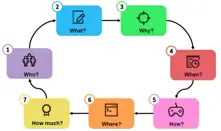What to Do When You're Asked an Unprepared Question in an Interview
Before an interview, you prepare as much as you can. You practice your self-introduction, confidently talk about your internship experiences and campus involvements, and even run through common ns numerous times. However, interviewers don't always stick to the script. Apart from the standard questions and those related to your field, they might throw you situational questions to evaluate your flexibility and problem-solving abilities.
For instance:
- "You are tasked with planning a marketing campaign for an electric car set to launch with a budget of US$28,000 within a month. How would you plan this? (Mercedes-Benz interview question)"
- "Smartphones have had a significant impact on our lives, making things more convenient but also causing people to become addicted. Do you think the benefits outweigh the drawbacks or vice versa? (Huawei interview question)"
- "Imagine you need to promote advertising on TikTok to B2B clients. How would you reach out to B2B customers? (ByteDance interview question)"
If you suddenly find yourself stumped, drawing a blank, and stuck in an awkward silence, you're not alone; this is something most interviewees have experienced. The more anxious you become, the less you know what to say, and you might end up rambling incoherently, leaving you feeling bewildered after the interview.
Providing a Satisfactory Answer

1. Stay Calm
The key is to stay composed when confronted with an unexpected question. Take a deep breath to regain your composure. Panicking will only make it more difficult to think clearly.
2. Clarify the Question
If you don't fully understand the question, it's okay to ask for clarification. This shows that you are attentive and thorough in your approach.
3. Structure Your Response
After understanding the question, structure your response. You can break it down into parts, outline the pros and cons, or consider different angles before providing an answer.
4. Buy Time
You can buy some time by reiterating the question or starting with a phrase like, "That's an interesting question." This gives you a few extra moments to gather your thoughts.
5. Think Aloud
If you're still unsure, think aloud. Explain your thought process to the interviewer, mentioning that you're considering different factors or perspectives.
6. Use Real-Life Examples
If possible, relate your answer to real-life examples or experiences. This can make your response more relatable and convincing.
7. Stay Positive
Even if you're not entirely sure about your response, maintain a positive and confident demeanor. Confidence can sometimes outweigh the specific content of your answer.
8. Conclude Clearly
Always conclude your response. Summarize your main points and provide a clear answer to the question.
Remember that interviewers are not just looking for the perfect answer; they are also assessing your ability to think on your feet, handle pressure, and communicate effectively. Even if you stumble a bit, demonstrating these qualities can leave a positive impression.
Problem Solving Framework

These situational questions primarily aim to assess a candidate's logical thinking abilities by presenting complex scenarios. They test whether an interviewee can quickly break down the situation, clarify key issues, and provide solutions. So, how can you provide an answer that satisfies the interviewer for these open-ended questions?
1. Is Faster Always Better?
No, it's not. If you're not a genius who can rapidly organize a response framework within a short time, take a patient approach. You can politely ask for a moment to think or ask if you can make some notes to structure your response. However, avoid thinking aloud while answering. It's best to have your overall thinking time within 3 minutes.
2. Should You Respond Directly With a List of Points?
Not necessarily. Instead of offering a direct response, focus on dissecting the question, pinpointing key contradictions and issues. Confirm with the interviewer, just like in the example promotion question, inquire about the expected goals, pricing of the electric car, the user profile, or the number of cars available for promotion.
3. Is Saying "I Don't Know" Acceptable When You Can't Think of an Answer?
Not exactly. If you're struggling to provide an answer, express your thought process. Inform the interviewer about what you're thinking, where you're encountering difficulties, and how you're approaching the problem. As long as your thought process is structured and logical, it can still demonstrate your problem-solving abilities.
5W2H Framework

Different interviewers may pose a wide range of questions, and you won't encounter the same questions repeatedly. To prepare for diverse questions, you can utilize the 5W2H analysis framework, which stands for "Why, What, Who, When, Where, How, How Much." When faced with a question, consider it from these seven angles:
- Why:Why do we need to address this? What are the reasons?
- What:What exactly is the issue? What is the goal? What tasks are involved?
- Who:Who is responsible or involved? Who are the stakeholders?
- When:When should this be addressed? When is the best timing?
- Where:Where does it need to be done? Where do we start?
- How:How do we approach this? How can we improve efficiency? How do we implement it?
- How Much: How much of this is required? To what extent? What's the cost-effectiveness?
When your mind goes blank, and you're unsure how to respond, you can use the 5W2H framework to break down the problem, clarify the issue, and structure your thoughts.
Practical Application of 5W2H
Now, let's see how the 5W2H framework can be used to answer the aforementioned interview question:
"Suppose you're preparing a marketing plan for an electric car set to launch with a US$28,000 budget within one month. How would you plan this? (Mercedes-Benz interview question)"
First, you may notice that the question provides very little information. In this case, you can engage in a dialogue with the interviewer or fellow group members (if it's a group interview).
You could ask questions like:
- "What's the pricing of this electric car?"
- "What's the product's positioning and its unique features?"
- "What's the user profile you're targeting?"
- "How many cars are available for promotion?"
Through this dialogue, you gather information such as the car's pricing, its technological advancements, the user demographics, and the available number of cars.
Now, applying the 5W2H framework, you can structure your answer:
- Why (Objective): The objective is to expand awareness among younger audiences about electric cars and cultivate a group of potential users. We expect a reach of over 2 million.
- What (Theme and Content): The theme is "Electric, From Now On, Mercedes-Benz." It emphasizes the perception of electric cars, environmental consciousness, and performance.
- When (Timeline): The campaign will run two weeks before the car's launch to create anticipation.
- Where (Channels): We plan to divide our goals: 1. Create promotional videos, collaborating with auto influencers and publishing them on platforms like Weibo, attracting a target audience of 1 million. 2. Partner with shopping malls to set up test drive points. Start online registration to invite people to experience test drives and create VLOGs. A limited number of participants.
- Who (Roles): Internally, we'll assign roles based on team members' expertise. Externally, we will contact suppliers, media partners, and promotional resources in advance.
- How (Implementation): We will spend one month preparing for the campaign. The actual campaign plan will take about 7 days. The initial phase will include planning and producing the promotional video and setting up the event. After about 20 days, we will have 3 days for final adjustments. We will monitor and evaluate the campaign's effectiveness based on online metrics and event feedback, and create a summary report after the campaign ends.
- How Much (Budget):The total budget is US$28,000. The breakdown includes US$7,000 for video production, US$10,000 for influencer and media advertising, and US$9,000 for test drive events. An additional US$2,000 will be kept for any unexpected expenses.
However, it's crucial to understand that the 5W2H framework is only the starting point for thinking. It's a structured, process-oriented framework for breaking down complex problems. When dealing with real-world situations and planning, you should use this framework as a basis, but always adapt it based on the specific context, knowledge, and experience you possess.
Do Not Panic

In summary, don't panic when faced with situational questions during interviews. Consult with the interviewer to clarify any missing information, use a structured thought process to dissect the problem, and rely on your knowledge and experience to provide detailed responses. Practice using the 5W2H analysis method to become proficient; interviewees can simulate questions from real interviews daily. Aniday wishes you all the best for your interviews!
Aniday's HR Services
Headhunting Service
Find and recruit quality candidates in just 1 week! Supported by 40,000 experienced headhunters in IT, Finance, Marketing… capable of recruiting in any region.
Headhunting Service ➔Employer of Record (EOR) Service
On behalf of your business, we recruit employees and handle payroll without the need to establish a company in markets such as Vietnam, Singapore, Malaysia, India, Indonesia…
Employer of Record (EOR) Service ➔